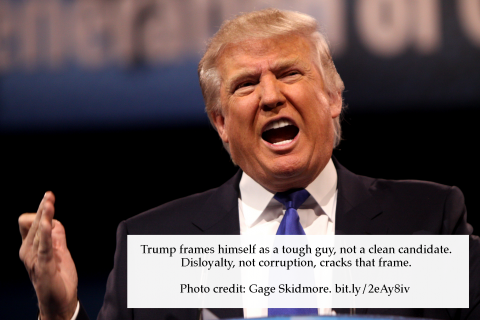
Thu 2016-10-13

Political Metaphors: Nurture, Discipline, and Deals You Can't Refuse.
In Why Trump, George Lakoff divides the Republican party into White Evangelicals, Pragmatic Conservatives, and Laissez-faire free-market proponents. All three flavors of conservatism think about government using a strict father metaphor.
According to Lakoff, we've had families much longer than we've had nation-states, so our brains turn to family metaphors to think about politics. Liberals win with nurturing parent metaphors, conservatives win with strict father metaphors. But if the best conservative strict fathers challenge their constituents and demand discipline – "keep calm and carry on" – then I think* Trump is something else entirely.
I believe he is ripping apart the Republican Party at the metaphor level as well as electorally. He doesn't tell you it is your duty to serve your country. Trump doesn't use discipline as a growth tool – "you're fired" – he only punishes. He claims that he can get Mexico to pay for the wall – he can make deals they can't refuse. If you follow him you won't face challenges, he will do it, he will provide the solution for his followers. He doesn't claim to be strict, only strong. Unlike American leaders from both parties, he doesn't frame himself with a parental metaphor.
Metaphors Underlying the 2016 Campaign
Clinton frames herself as "qualified." Trump frames himself as the man who makes deals you can't refuse. His followers feel like they are under siege, and he casts himself as the man to lead them against their opponents. This matches a gang-leader metaphor, not any flavor of parenting-style metaphor. We've always had families, so we turn to family metaphors to understand new-fangled national politics. But we've also always had hierarchies and gangs led by alpha-males – since before we evolved into homo sapiens – so this too might be a frame to understand modern national politics.
Trump has left behind generations of pragmatic conservatives who were focused on demanding discipline, responsibility and avoiding free-rider problems. Both Democrats and Republicans – both nurturing and disciplined parents – need to be "qualified," need to avoid corruption and be knowledgeable about the details of governance. But a gang leader needs only to be strong and to represent you against others who are your enemies.
The Gang Leader's Weakness: Disloyal Donald
Donald is generating a sense that his followers are under siege.
Hypocrisy is not a key to dismantling a gang leader. He is overweight and fat-shames. This is no accident. When he fat-shames someone, if we fat-shame him back, we solidify his frame of gangs in combat. We need to be careful mocking Trump in ways that could make his followers feel under siege. Mocking his small hands, mocking his weight issues, mocking his hair – all these are insults towards him that he can personally ignore, while voters with similar body-issues will also feel mocked and all the more likely to turn to him.
Corruption is also not a key. Gang leaders are allowed to lie, bluster and be corrupt. When people feel like they have been ignored and abused for decades and are turning to a strongman protector, they don't look for fairness or even integrity, just strength.
The one thing a gang leader cannot be is disloyal. When you want to go negative, target him as:
"Disloyal Donald."
The Clinton campaign should remind people of every loyalty they hold that has been betrayed by Trump.
Remind people that he turned the Republican primary in a tire fire. He wants the loyalty of Republicans but thinks Jeb Bush is a disaster, Rubio was a disaster, Kasich was a disaster. He insulted Cruz's wife and Clinton's husband. Focus on the overlap of loyalties: he invited the Clintons to his wedding and then tears them down, he wants to work with Cruz and then insults his wife. People believe he is on their side when he isn't. Glenn Beck says he is "a bridge too far," Schwarzenegger for the first time ever won't vote for the Republican. People who are always loyal to the Republican Party are rejecting him. He is disloyal and his team is abandoning him.
Use the names of ordinary people who worked for him and were betrayed. A new name every week until people memorize it, and then repeat the names from past weeks in a growing list. This would mean half a dozen names by election day. In every case, start by explaining how someone did something for Donald and then was betrayed. Try to get your listeners walking in the shoes of people excited to work for him. Khizr Khan’s son served his country and Donald turns on his family. Alicia Machado was a teenager who thought she was getting her big break from Donald, and then he turned on her.
Republicans Did Not Want a Gang Leader: Call Them to Their Values
Searching with difficultly for a positive side, most Republicans do not want to join a gang. Donald only had a plurality of support, conservatives are being dragged into this, unhappy with any of their choices. Millions are trying to decide between in-group loyalty to the Republican Party and the values they previously held.
Many of Donald's supporters don't believe he will build the wall. They see him as bluster. Most are grossed out by what he calls "locker room" behavior. They are trapped between their party-loyalty and disgust at their candidate. Their way out of the trap is to compare him to a Clinton, to find a way to make this about teams again.
In Don't Think of an Elephant, Lakoff encourages us not to use (even to negate) the opponent's frame. For 2016, this means avoiding stories where we are pitted against each other. Stop attacking Republicans for nominating Donald – something that has already happened and can't be changed. Switch to challenging them to stand for what they believe, now. Continue to hold out the possibility of cross-partisan respect, continue to hold out that we want an America with leaders from FDR to Eisenhower where we convince each other rather than demonize.
In social media, echo conservative and religious voices that have had enough. Don't attack from the left, or we just create further divisions.
I think it is particularly powerful to demand that conservative friends stand up for their own values when talking with other conservatives. Avoid the question, for the moment, of whether Clinton or Trump is worse, since this allows cognitive bias and team loyalty to run rampant. Instead narrow down to what they believe, and demand they put their voice to it among other conservatives in their circles. If Trump sexually assaulting women is against their values, request they say it to their conservative friends. Move away from liberal vs conservative, to demanding a bit of bravery and integrity.
###
* George Lakoff has argued that Trump fits with the strict father metaphor. Much of this blog is in debt to Lakoff's approach to framing, but I diverge in regards to the metaphors that underly Trump's campaign, as gang leader rather than strict father. Lakoff's Don't Think of an Elephant is a great introduction to political metaphors and framing. * The t-shirt-ready phrase "keep calm and carry on" is often misattributed to Churchill, but I think the phrase has stuck because it's a good way to express both Churchill's approach to dealing with real threats and the discipline at the heart of healthy conservatism.

How do you think Trump frames himself, and what story best cracks that frame?